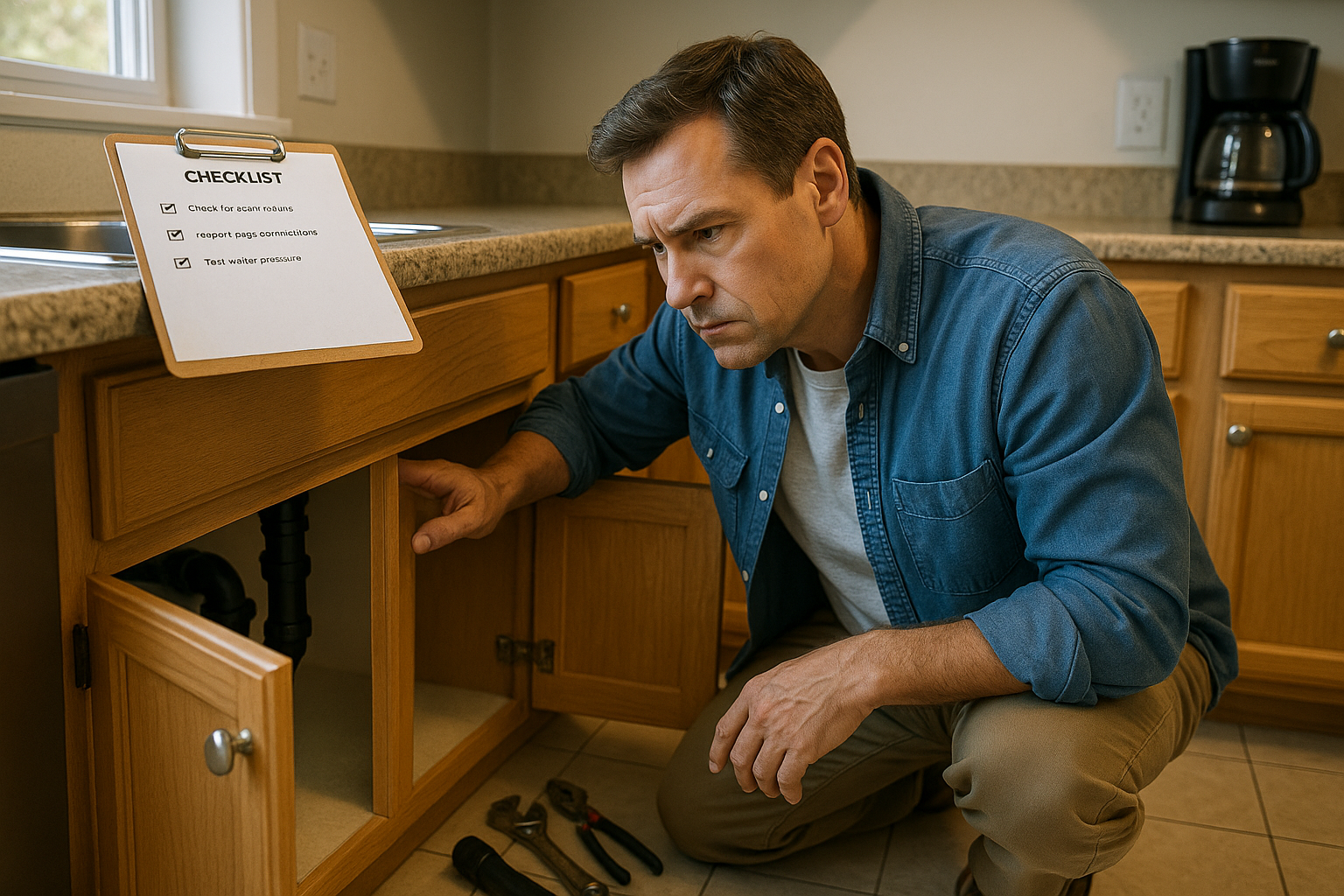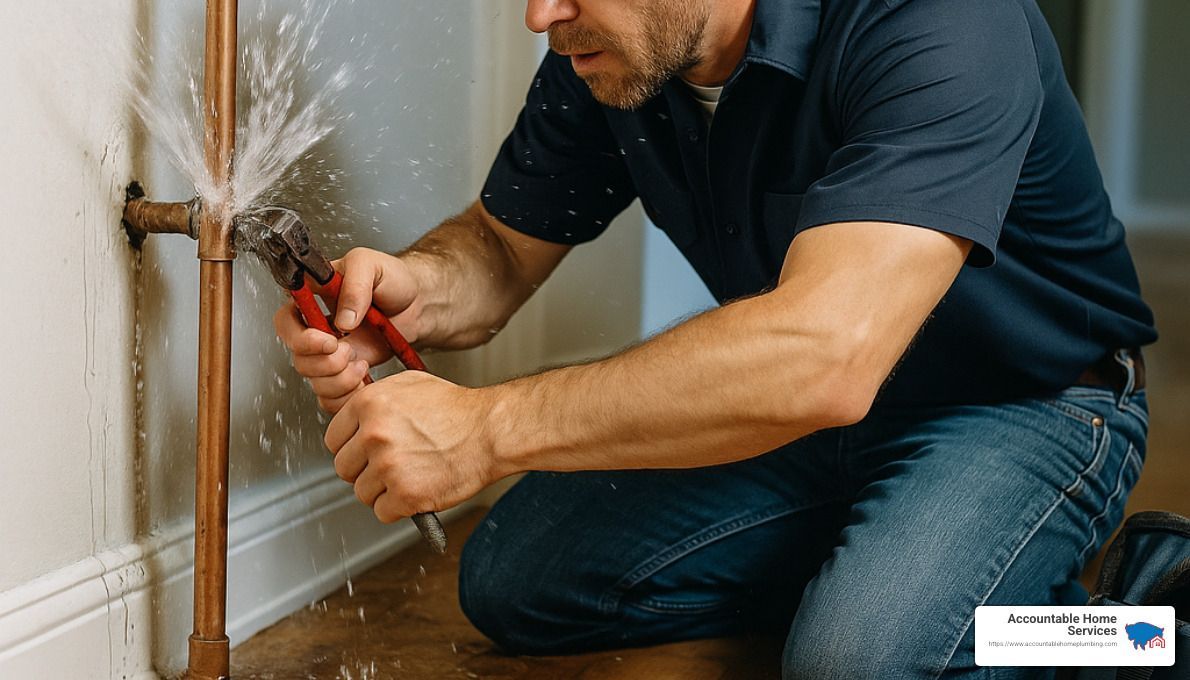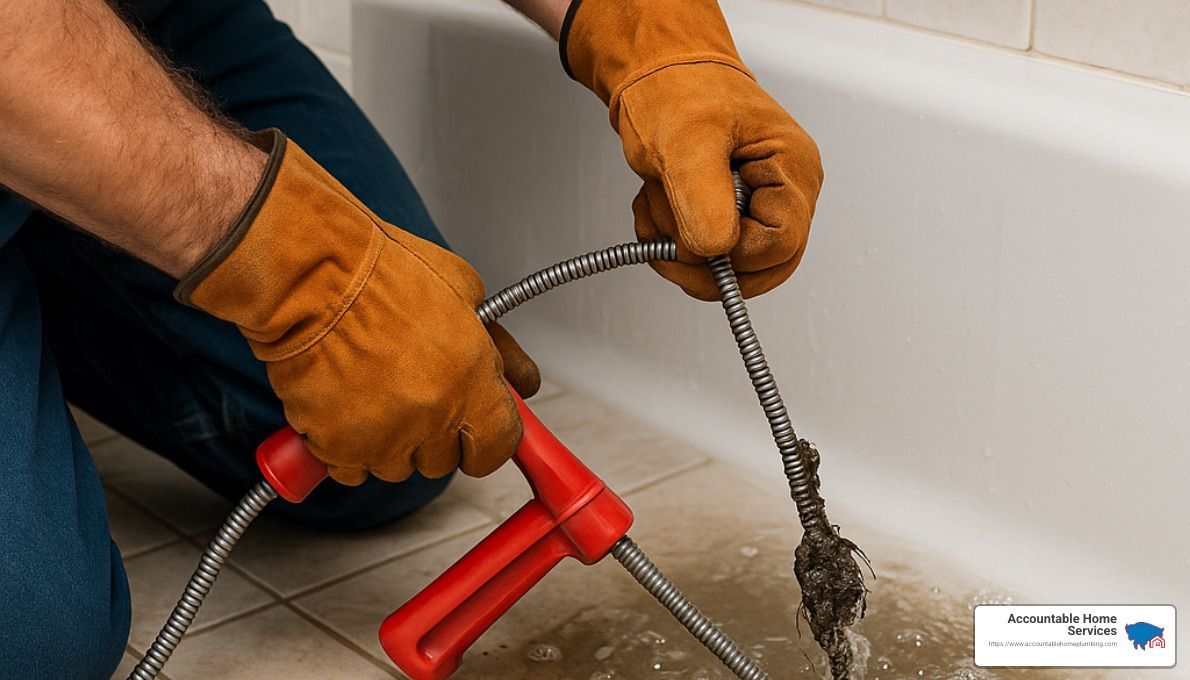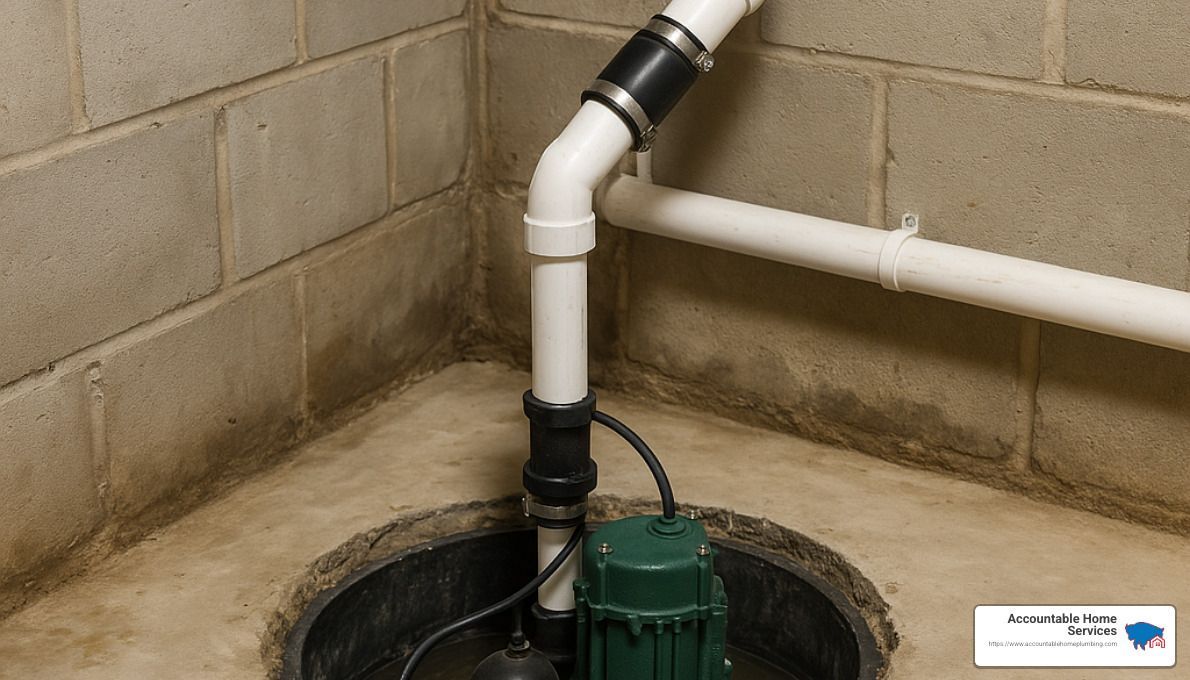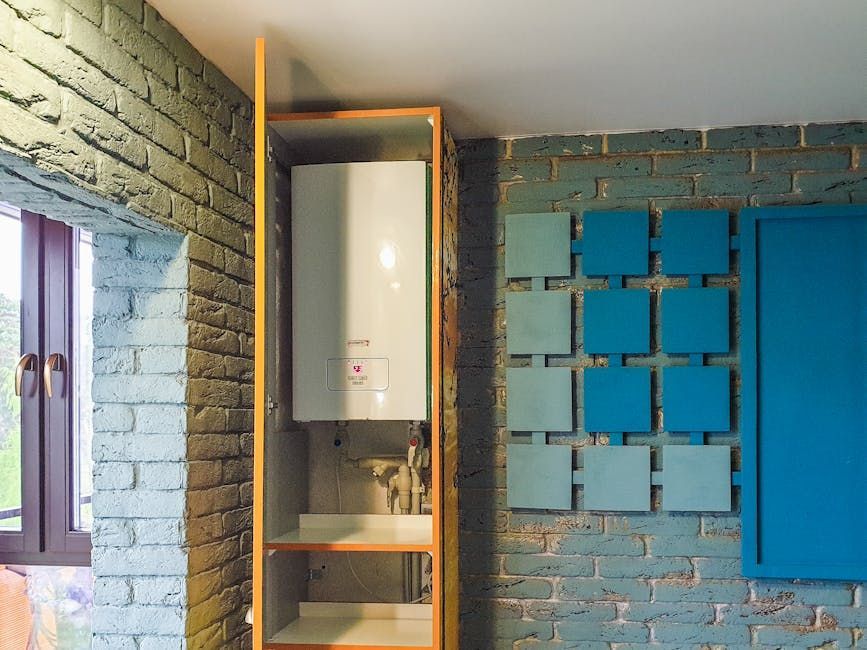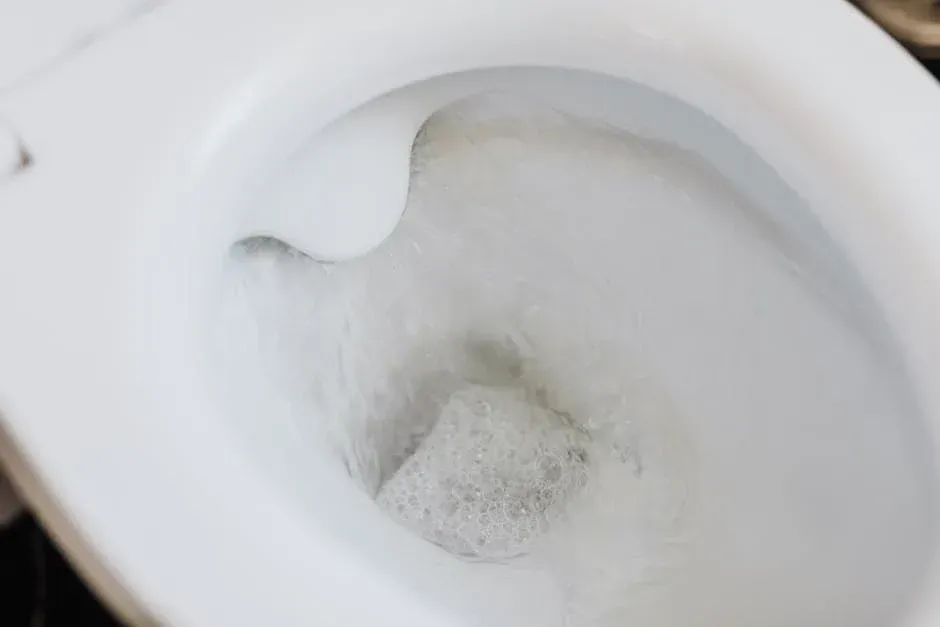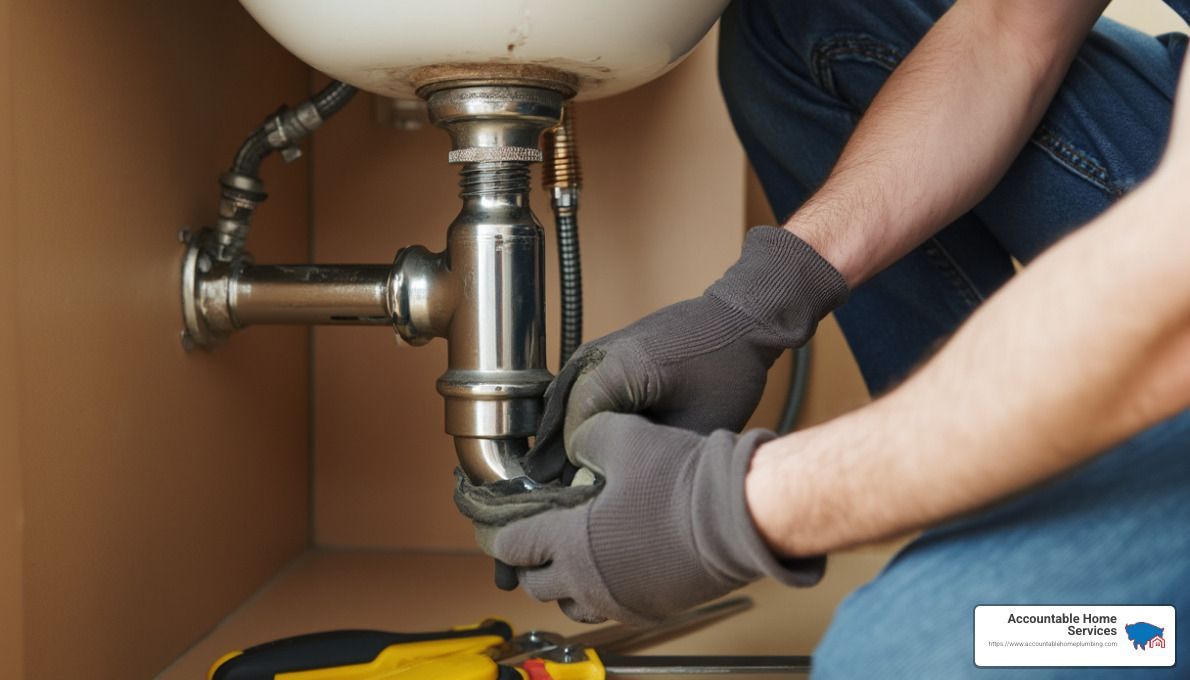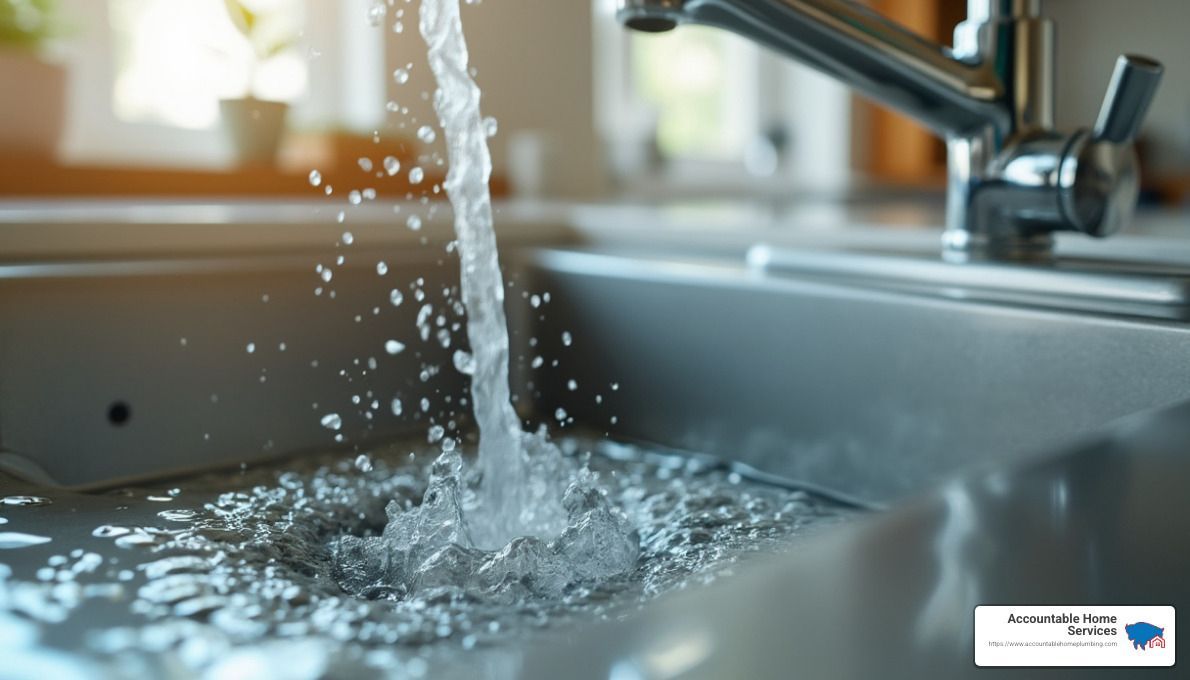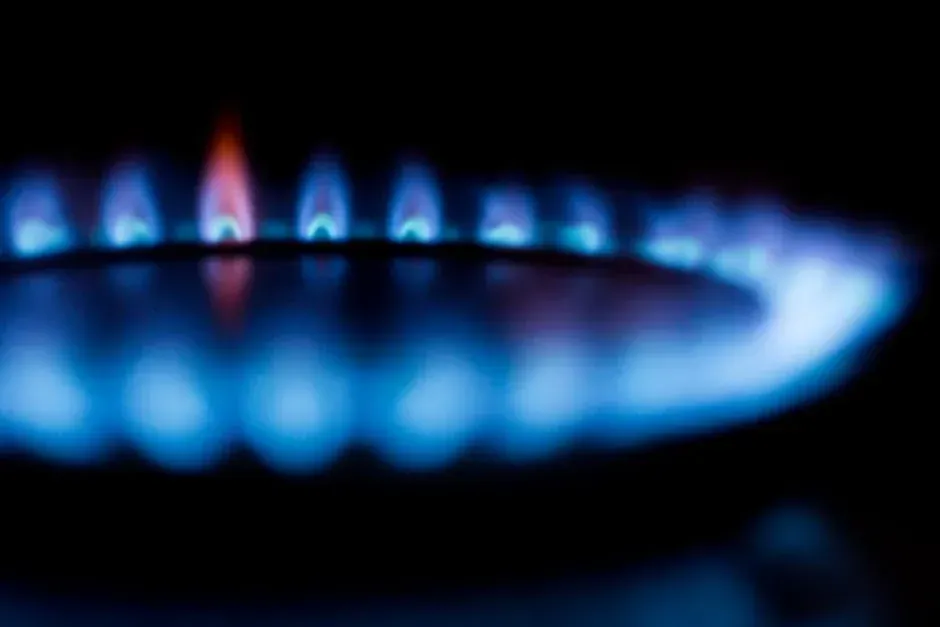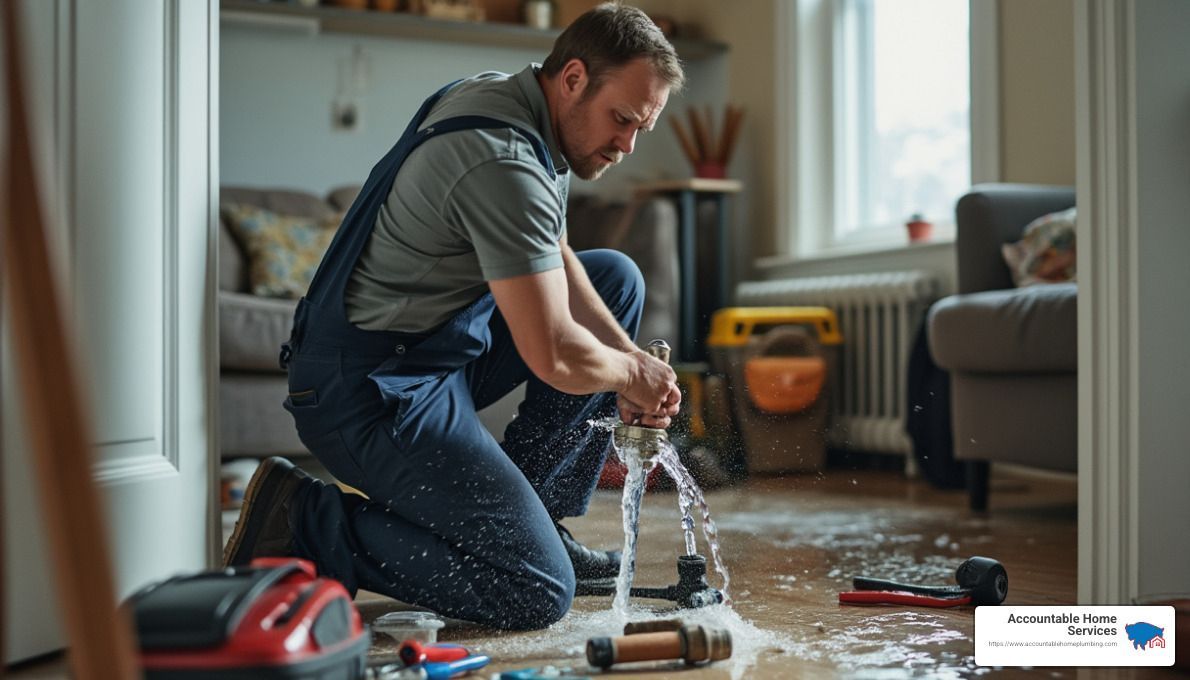Dry Days Ahead: Fixing Water Leaks in Denver
When Water Trouble Strikes: Understanding Denver's Leak Challenges
Water leak repair Denver services are essential for homeowners facing the stress and potential damage of unwanted water. If you're dealing with a leak right now, here's what you need to know:
- Emergency Response: Turn off your main water valve immediately and call a professional at 303-536-5889
- Common Signs: Look for wet spots on walls, increased water bills, or sounds of running water when fixtures are off
- Cost Impact: A slow drip can waste 150 gallons daily, adding significantly to your water bill
- Professional Solutions: Denver specialists use advanced detection technology including acoustic equipment and thermal imaging
Water leaks in Denver homes present unique challenges due to our climate, aging infrastructure, and diverse piping materials. From freezing winter temperatures that can cause pipes to burst to the effects of our mineral-rich water on older plumbing systems, Denver homeowners face specific leak concerns that require prompt, professional attention.
"Please help save water and keep your water bill down by promptly repairing leaks."
Left unaddressed, even small leaks can lead to serious structural damage, dangerous mold growth, and repairs costing thousands of dollars. Professional water damage restoration typically ranges from $2,000 to $5,000, while roof leak repairs average between $300 and $1,100.
I'm Mike Martinez, owner of Accountable Home Plumbing and a Denver native with experience in water leak repair Denver homes require due to our unique climate and infrastructure challenges. My team and I provide 24/7 emergency response because we understand that when water leaks strike, every minute counts for protecting your home.
For more information about water conservation in Denver, visit Denver Water's conservation tips.
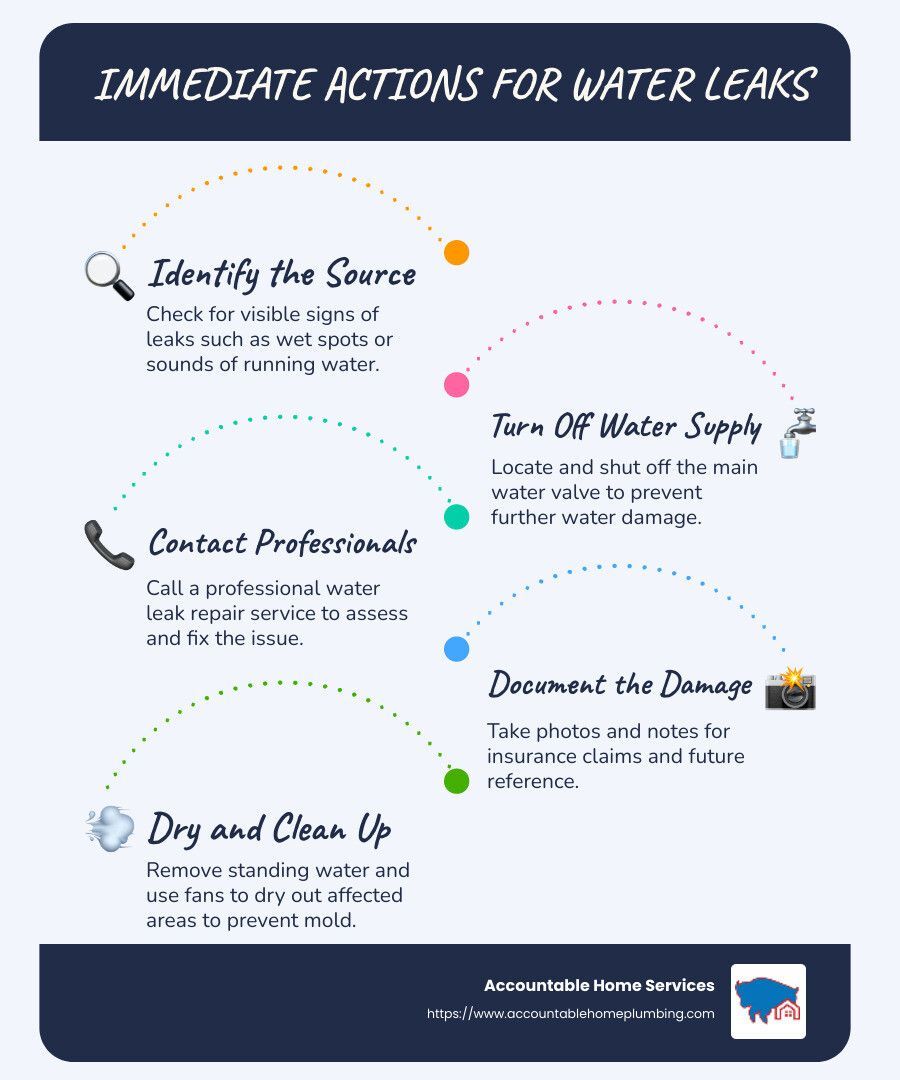
Understanding Water Leaks in Denver Homes
Living in Denver means enjoying our beautiful mountain views and 300 days of sunshine, but it also means our homes face unique plumbing challenges. Our Mile High climate puts extraordinary stress on the pipes running throughout your walls, floors, and yard.
When winter arrives and temperatures drop below freezing (sometimes for days on end), the water inside your pipes can freeze and expand. This creates pressure that can lead to cracks or complete pipe bursts. Then, when things warm up, these weakened pipes may finally give way, leaving you with an unexpected indoor waterfall.
"Your house is full of hundreds of feet of water pipes that run through every room," as we often remind our customers. That's a lot of potential trouble spots hidden behind your walls!
Denver's notorious clay soil also plays a surprising role in causing leaks. This expansive soil swells when wet and shrinks when dry – a constant dance that puts stress on underground pipes. During our seasonal changes (especially spring snowmelt and summer monsoons), this soil movement can literally bend and break pipes buried in your yard.
The pipes in your Denver home might be made of various materials, each with its own vulnerabilities:
Copper pipes are common in homes built from the 1970s through the 1990s. While durable, they're not immune to Denver's mineral-rich water, which can cause pinhole leaks over time. If you live in neighborhoods like Stapleton or Lowry, you might be dealing with copper.
Galvanized steel pipes are the old-timers, found in historic Denver neighborhoods like Washington Park and Capitol Hill. With a lifespan of 40-50 years, many of these pipes are now well past retirement age, suffering from internal corrosion that restricts water flow and eventually leads to leaks.
PVC and CPVC plastic pipes resist corrosion but can't handle our temperature swings as well as metal. They become brittle with age and can crack, especially at joints where they connect to fixtures or other pipe sections.
PEX tubing is the new kid on the block, found in recently built or renovated homes. It's flexible and freeze-resistant, but can still develop leaks at connection points if not properly installed.
Denver's water itself contributes to our plumbing woes. Our mountain snowmelt picks up minerals on its journey to your tap, and these minerals build up inside pipes over time. This narrows the path for water, increases pressure, and can eventually lead to failures – particularly in older homes with original plumbing systems.
All these Denver-specific factors explain why water leak repair Denver homes require isn't just generic plumbing work. It demands specialized knowledge of our unique conditions. The combination of extreme temperature swings, shifting soils, aging infrastructure, and mineral-rich water creates the perfect storm for leaks that need prompt, professional attention.
At Accountable Home Services, we've seen how Denver's environment affects every type of plumbing system, giving us the experience to quickly identify and fix issues before they turn into major problems.
Water Leak Repair in Denver: Common Signs to Watch For
Detecting water leaks early can save Denver homeowners thousands in repair costs and prevent significant structural damage. Being vigilant about these warning signs is your first line of defense against escalating water damage problems.
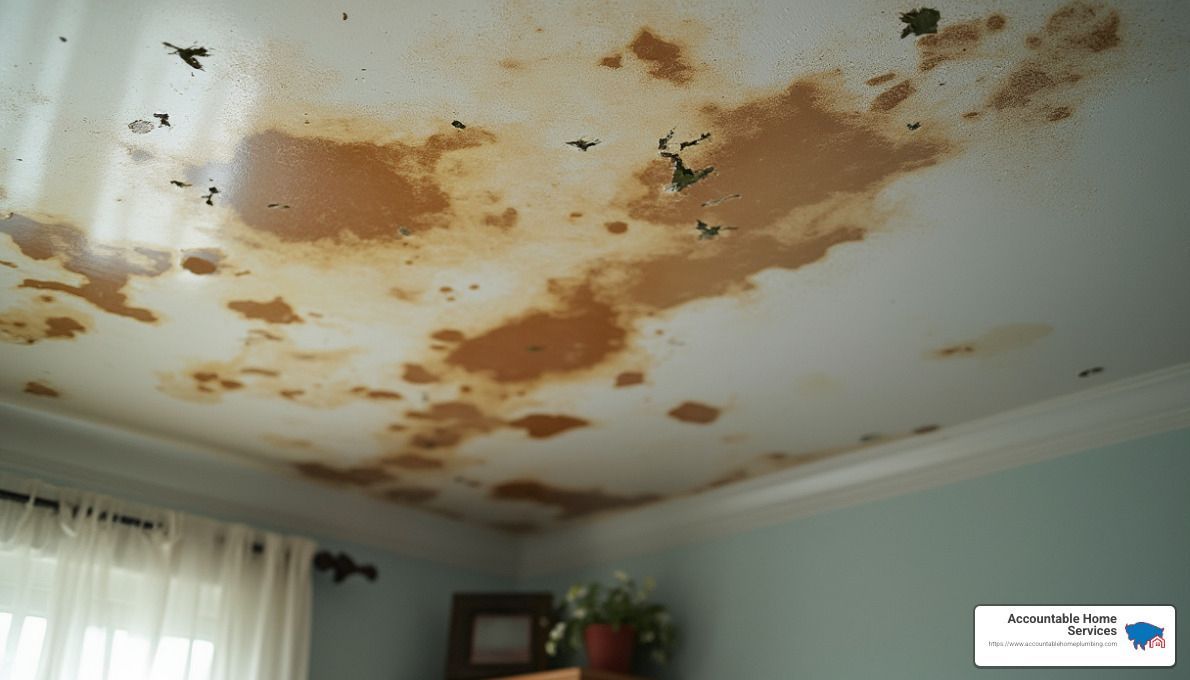
Visual Indicators of Water Leaks
Your home speaks to you when something's wrong – you just need to know what to look for. Those wet spots or water stains on your ceiling aren't just cosmetic issues. They're your home's way of saying "Hey, there's water where it shouldn't be!" These telltale discolorations – typically brownish, yellowish, or darker than surrounding areas – often reveal water seeping through from hidden pipes.
When you notice peeling paint or wallpaper, that's another red flag. Moisture building up behind walls causes these materials to lose adhesion. In Denver's typically dry climate, this kind of moisture problem almost always indicates a plumbing issue that needs attention.
Walking around your yard and spot an unusually soggy area? Water seeping in the yard, especially during our dry Colorado days, often points to an underground pipe leak. Those suspiciously lush green patches of grass might look nice, but they could be receiving an unintended irrigation system from a leaking pipe below.
Visible mold or mildew should immediately grab your attention. Those black, green, or white spotty growths on walls, ceilings, or corners simply shouldn't be thriving in Denver's dry climate. Their presence almost certainly means excess moisture is feeding them – and that moisture is coming from somewhere it shouldn't.
If your hardwood floors start to warp, cup, or buckle, water is likely the culprit. Warped or buckling flooring occurs when wood absorbs moisture from below, causing it to swell and change shape. This is particularly common with slab leaks or leaking water lines beneath your home.
Non-Visual Signs That Require Attention
Not all leak indicators are things you can see. Sometimes the first hint comes in your mailbox – when you open your unusually high water bill. A sudden spike in water usage without explanation is often your earliest warning of a hidden leak. As Denver Water often reminds residents, "Leaks aren't always obvious, but they can often waste water and increase water bills."
Have you noticed low water pressure throughout your home or just in certain fixtures? This drop might mean water is escaping your plumbing system before reaching its intended destination. When a pipe leaks, it diverts water that would otherwise maintain proper pressure at your faucets and showerheads.
The sound of running water when all fixtures are turned off is one of the most reliable indicators of a leak. Late at night, when your home is quiet, take a moment to listen. That unexpected trickling sound could be saving you thousands in future repairs if you address it promptly.
Your nose can also detect problems. Musty odors that persist even after cleaning often indicate hidden moisture. That damp, earthy smell is typically mold or mildew growing in areas you can't see – behind walls, under floors, or in crawl spaces – fed by water from a leak.
Here's a sobering statistic that makes even small leaks worth your attention: A slow drip can waste as much as 150 gallons of water each day, or 4,500 gallons per month. That's not just bad for the environment – it's terrible for your water bill too.
Denver's unique climate creates some special considerations for leak detection. During winter, watch for ice formation on exterior walls or unusual warm spots on floors with radiant heating, as these may indicate leaking pipes. In summer, when outdoor water usage increases, checking your water meter becomes even more important for catching potential leaks early.
For water leak repair Denver professionals, these warning signs are crucial diagnostic indicators that help pinpoint exactly where your plumbing system is failing. By knowing what to look for, you can catch problems early and protect your home from extensive water damage. Remember – when it comes to water leaks, minutes matter, and early detection can make all the difference.
The Importance of Prompt Water Leak Repair
That small drip from your kitchen faucet might seem harmless, but it's secretly plotting against your home and wallet. When it comes to water leaks in Denver homes, procrastination can turn a simple fix into a financial nightmare.
Structural Damage Escalates Quickly
Water is incredibly sneaky and destructive. What starts as a tiny water stain on your ceiling today can become a major structural headache tomorrow.
Think about your home's foundation – the bedrock of your property's value. Water from leaking pipes can silently erode the soil supporting it, leading to settling and cracks. In worst-case scenarios, you might face structural failure that costs tens of thousands to repair.
If you live in one of Denver's charming older homes with wooden structural elements, persistent moisture is your enemy. Wood rot doesn't announce itself with fanfare – it quietly compromises your home's load-bearing capabilities until one day you notice sagging floors or ceilings.
Your drywall isn't designed to handle prolonged moisture either. Once saturated, it loses its integrity, becoming soft and eventually crumbling away. And yes, in severe cases that ignored leak can lead to complete ceiling collapse – creating not just a repair headache but a genuine safety hazard for your family.
When the damage gets this far, you're looking at professional water damage restoration costs typically between $2,000 and $5,000 – and that's on the conservative end if you've caught it relatively early.
Health Concerns From Delayed Repairs
Beyond your property, water leaks create perfect conditions for things that can harm your family's health.
Most Denver homeowners are surprised to learn that mold can begin developing in as little as 48 hours after water exposure – even in our normally dry climate. Once established, mold releases spores that can trigger allergic reactions, asthma attacks, and respiratory problems, with children and elderly family members at highest risk.
Standing water from leaks doesn't just sit there looking unsightly – it becomes a breeding ground for bacteria that pose additional health risks to everyone in your home.
"Ignoring small leaks can lead to costly repairs and excessive water waste."
Financial Impact of Procrastination
The financial toll of putting off water leak repair Denver homes need is steeper than most realize.
That innocent-looking drip might only add a few dollars to this month's water bill, but over time, it adds up dramatically. Conservation experts have found that barely perceptible leaks can waste thousands of gallons annually, translating to hundreds of extra dollars flowing straight down the drain.
Many homeowners learn the hard way that insurance companies aren't sympathetic to neglect. When leaks have clearly been ongoing for extended periods, claims are frequently denied, leaving you to shoulder the full financial burden.
And if you're thinking about selling your home someday, documented water damage – especially with mold issues – typically means a lower selling price and longer time on the market. Potential buyers and their inspectors are specifically trained to look for signs of water problems.
Environmental Considerations
Living in Denver's semi-arid climate means we should all be mindful of water conservation. Every drop matters in our drought-prone region.
Denver Water has documented that even a slow leak wastes approximately 4,500 gallons monthly – precious water that our community can't afford to lose. Beyond the water itself, consider the energy used to treat and pump that water to your home. When it's wasted through leaks, you're also contributing unnecessarily to carbon emissions.
For more information about the environmental impact of water waste, check out the EPA's WaterSense program which provides valuable resources on water conservation.
When you add up all these factors – structural damage, health concerns, financial impacts, and environmental responsibility – the verdict is clear: addressing water leaks immediately is always the smartest decision you can make as a homeowner.
That small leak won't fix itself, and every day you wait compounds the potential damage. When you need water leak repair Denver professionals you can trust, a quick response now prevents bigger headaches later. Your home, your health, and your wallet will thank you.
Effective Methods for Detecting Hidden Water Leaks
Finding where water is hiding in your Denver home can feel like solving a mystery. Those sneaky leaks behind walls, under floors, or buried in your yard often reveal themselves only after they've already caused damage. Fortunately, modern technology has given us better ways to track them down without tearing your home apart.
Advanced Leak Detection Technologies
Gone are the days when finding a leak meant breaking open walls and hoping for the best. Today's water leak repair Denver specialists have tools that would make any detective jealous.
Acoustic Listening Equipment
Think of this as a doctor's stethoscope for your pipes. These sensitive devices can hear what human ears can't – the distinctive sound of water escaping from pipes, even in tiny amounts.
Our technicians place these sensors against walls, floors, or near pipes to listen for the telltale sounds of leaks. One delighted customer called it "Like Batman for leaks," which made us smile. This technology is especially valuable in Denver's historic homes with beautiful plaster walls that nobody wants to damage unnecessarily.
Thermal Imaging Cameras
Water leaves a temperature footprint that these special cameras can see, even when your eyes can't. Since water typically appears cooler than surrounding dry areas, these infrared cameras reveal hidden moisture as blue or purple areas on the display.
This technology is particularly helpful in finished basements or areas with expensive finishes where you'd rather not cut exploratory holes. We can scan entire rooms quickly and see exactly where moisture is hiding behind surfaces.
Moisture Meters and Sensors
Sometimes the evidence is right at our fingertips. These handheld devices give us precise measurements of moisture levels in building materials. When we press them against a wall, floor, or ceiling, they tell us exactly how wet things are behind the surface.
This objective measurement helps us track moisture before visible damage occurs and monitor the drying process after repairs. No more guessing if that slightly darker spot is actually wet or just a shadow.
Video Pipe Inspection
For sewer lines and larger accessible pipes, we send in the tiny explorers – high-definition cameras that travel through your pipes and show us exactly what's happening inside. These waterproof cameras with bright LED lights capture real-time video as they travel, revealing cracks, root intrusions, or other damage that might be causing leaks.
It's like giving us x-ray vision for your plumbing system, without any radiation or superpowers required.
Pressure Testing
Sometimes the most effective approach is also the most straightforward. By pressurizing a closed pipe system and watching for pressure drops, we can determine if and where leaks exist.
This method works particularly well for swimming pool plumbing, radiant floor heating systems, and other closed-loop systems where water shouldn't be escaping. We can isolate different sections to narrow down the exact location of problems.
Professional vs DIY Detection
While there are some basic leak checks homeowners can perform, professional detection offers significant advantages that save time, money, and headaches in the long run.
You can certainly check your water meter when all fixtures are off (movement indicates a leak), look for obvious moisture signs, or add food coloring to your toilet tank to check for silent leaks. These DIY approaches catch some problems, but they miss many others.
Professional detection brings precision to the process. Our specialized equipment finds leaks that DIY methods simply can't detect, and our experienced technicians know how to interpret subtle indicators that might confuse homeowners. Most importantly, our non-invasive technologies minimize damage to your property during the detection process.
As one industry expert puts it, "Using non-invasive leak detection methods minimizes damage to property." This approach is especially important in Denver's charming older homes where preserving original features matters to homeowners.
Effective Water Leak Repair Methods Used in Denver
Once we've pinpointed a leak, the repair approach depends on several factors including your pipe material, the leak location, and the extent of damage. Modern water leak repair Denver techniques aim to solve the problem with minimal disruption to your home and life.
Spot Repairs vs. Repiping
For isolated leaks in otherwise healthy plumbing, we often recommend spot repairs. These might include replacing a small section of pipe, resoldering or replacing a problematic joint, or applying specialized epoxy patches to seal small leaks.
However, when we find multiple problem areas or signs of systemic deterioration, more comprehensive solutions make more sense. These might include partial repiping of affected areas, whole-house repiping when multiple systems are failing, or trenchless pipe replacement for underground service lines. We'll always explain your options clearly so you can make an informed decision.
Specialized Equipment for Denver Conditions
Denver's unique climate and soil conditions require specialized repair approaches. Our freezing winters, expansive clay soils, and mineral-rich water create specific challenges that demand specific solutions.
We use freeze-resistant pipe materials for exterior walls, include expansion joints that accommodate our soil's seasonal movement, and can apply anti-corrosion treatments for pipes affected by our mineral-rich water. This localized knowledge makes a significant difference in how long repairs last.
At Accountable Home Plumbing, our approach is simple: "With years of experience in both leak detection and leak repair, we provide efficient and effective services custom to meet the needs of your Denver home." We combine advanced detection with appropriate repair methods to ensure that your water leak repair Denver solution is both immediate and long-lasting, protecting you from repeat problems and cascading damage.
Steps Homeowners Should Take When Suspecting a Leak
Water leaks don't wait for convenient times to appear. When you spot the telltale signs of a leak in your Denver home, quick action can make the difference between a minor inconvenience and a major disaster. Here's what you should do right away to protect your home while professional help is on the way.
Immediate Actions to Take
First things first – stop the water! Locate your main water shut-off valve, typically found where the water line enters your home (often in the basement, crawl space, or utility room). Turn it clockwise until it's fully closed. This simple step immediately prevents additional water from entering your plumbing system and causing further damage.
Water and electricity create a dangerous combination. If you notice water near electrical outlets, appliances, or fixtures, head straight to your circuit breaker and turn off power to those areas. Your safety should always be your top priority.
Once you've addressed these immediate concerns, grab some towels, mops, or a wet vacuum to clean up any standing water. This reduces slip hazards and helps prevent water from seeping deeper into your flooring or walls.
"It's always a better idea to be safe than to be sorry."
While you're cleaning up, take a moment to document everything. Clear photos or videos of all visible damage will be invaluable when dealing with insurance claims later. Capture wet areas, water stains, and any damaged belongings before you start moving things around.
Even after shutting off your main valve, it's worth checking your water meter. If the indicator is still moving, you might have a leak between the meter and your home – something that could require involvement from your utility company.
Using Your Water Meter as a Diagnostic Tool
Your water meter isn't just for billing – it's also a powerful leak detection device hiding in plain sight. To use it effectively, make sure all water-using appliances in your home are turned off (including ice makers, humidifiers, and irrigation systems). Locate your water meter (typically near the street in a covered box) and note the exact position of the flow indicator – often a small triangle or dial.
Wait about 30 minutes without using any water, then check the meter again. Any movement indicates water is flowing somewhere in your system. Most Denver water meters include a small red triangle or gear-shaped indicator that can detect even tiny flows, making this test remarkably accurate even for minor leaks.
Safety Precautions During a Water Emergency
When dealing with a water leak, safety should remain your top concern. If the leak involves sewage or contains visible contaminants, avoid direct contact – this water may harbor harmful bacteria that can cause illness.
Be cautious about structural hazards too. Water-saturated ceilings may bulge downward before collapsing, and waterlogged floors might not support your weight as expected. Trust your instincts – if an area looks unsafe, stay away and wait for professionals.
If your leak has been ongoing for more than a day or two, mold may have already begun growing. Limit your exposure to affected areas, especially if you or family members have asthma or other respiratory sensitivities. Open windows and doors if weather permits to increase airflow and aid drying. Fans can help circulate air, but only use them after ensuring there are no electrical hazards nearby.
Documenting for Insurance Purposes
When it comes to insurance claims, detailed documentation can make a world of difference. Take date-stamped photos of everything affected by the leak. Keep samples of damaged materials when practical, and maintain a detailed list of affected items and areas.
Save every receipt related to your emergency – from shop vacs you purchased to hotel stays if your home becomes temporarily uninhabitable. Document all communications with water leak repair Denver specialists and insurance representatives, noting dates, times, and the substance of conversations.
Most insurance policies cover sudden, accidental water damage but may deny claims for long-term leaks that should have been addressed through normal maintenance. Your prompt action and thorough documentation demonstrate that you've taken responsible steps to mitigate damage – something insurance adjusters definitely notice.
When to Call for Professional Water Leak Repair Denver
While minor drips might tempt you to break out your toolbox, most water leak scenarios benefit tremendously from professional expertise. Here's when you should definitely call for water leak repair Denver specialists:
Signs It's Time for Professional Help
Any leak where you can't visually identify the exact source requires professional detection equipment. Hidden leaks often cause the most damage precisely because they go unnoticed for so long. Similarly, if you've attempted repairs but the problem keeps returning, this indicates a more complex issue that needs expert diagnosis.
When your water meter shows activity even with all fixtures off and after shutting the main valve, you likely have a service line leak requiring specialized equipment. Multiple leak points throughout your home often signal a systemic plumbing issue rather than an isolated problem.
Pay attention to your water pressure too – significant drops throughout your home suggest a potentially serious main line leak. Discolored water (brown, yellow, or rusty) can indicate pipe corrosion that demands professional evaluation. And any suspected leak under a concrete foundation slab requires immediate professional attention to prevent costly foundation damage.
Benefits of Timely Professional Intervention
Professional water leak repair Denver services offer several key advantages over DIY approaches. Professionals use specialized equipment like thermal cameras and acoustic sensors to locate hidden leaks that might otherwise remain undetected until causing significant damage. They also identify not just the immediate leak but underlying causes that might lead to future problems.
Licensed plumbers ensure all repairs meet local building codes and standards – particularly important in Denver's older neighborhoods with evolving plumbing regulations. Reputable companies like Accountable Home Plumbing stand behind their work with service guarantees, providing peace of mind that DIY repairs simply cannot match.
Many insurance policies actually require professional repair documentation for water damage claims to be approved. Beyond the repair itself, professionals address potential secondary issues like mold growth or structural weakening that might otherwise be overlooked.
At Accountable Home Plumbing, we understand that water leaks don't follow a convenient 9-to-5 schedule. That's why we offer 24/7 emergency water leak repair Denver services with rapid response teams typically arriving within 60 minutes of your call – helping to minimize damage during those critical early hours of a water emergency.
Preventing Future Water Leaks
After dealing with the stress and expense of a water leak, most Denver homeowners want to avoid repeating the experience. The good news? A thoughtful prevention strategy can dramatically reduce your risk of future water woes.
Regular Maintenance Practices
Think of your plumbing system like your car—regular check-ups prevent breakdowns. Start by inspecting visible pipes every few months. Take a flashlight and look under sinks, around toilets, behind your washing machine, and near your water heater. You're looking for any signs of moisture, green corrosion on copper, or rust on steel pipes.
Your water pressure deserves attention too. Excessive pressure—anything above 80 psi—puts daily stress on your entire plumbing system. It's like constantly overinflating a balloon; eventually, something gives. Consider installing a pressure regulator if yours runs consistently high.
Professional inspections every 2-3 years are worth their weight in gold. A trained eye can spot developing issues in places you might never check, like inside walls or under your foundation. Think of it as preventative medicine for your home.
Don't overlook your drains! Regular cleaning prevents the clogs that create pressure buildup in your pipes. A simple monthly treatment with enzyme-based cleaners can keep things flowing smoothly without damaging your pipes like harsh chemicals might.

